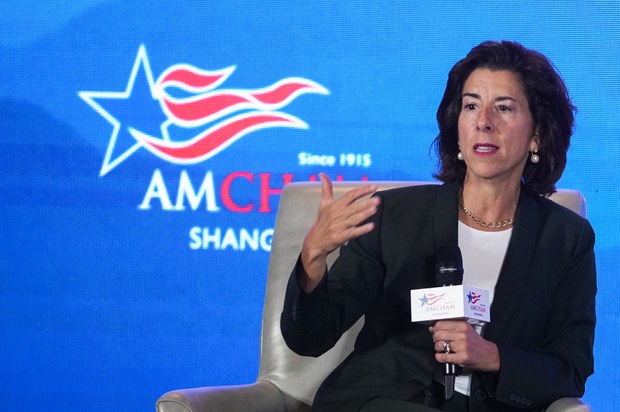US’s Gina Raimondo concludes China visit on mixed notes
Share

U.S. Secretary of Commerce Gina Raimondo speaks at AmCham Shanghai’s Women’s Executive Network’s 2023 WeForShe Conference in Shanghai on August 30, 2023.
United States Commerce Secretary Gina Raimondo wrapped up a four-day visit to China on Wednesday with remarks at a conference for women executives in Shanghai in what some commentary suggested would highlight China’s increasing paucity of gender diversity in politics.
In July, Chinese social media users attacked female economists online for eating dinner with U.S. Treasury Secretary Janet Yellen, even calling them traitors, in a social media outburst that was telling about China’s complex feelings about the U.S. and the role of women in society.
Over the past 10 years of Xi Jinping’s rule, the number of women in politics has fallen and feminist voices have been increasingly muzzled.
The fourth Biden administration official to visit China in recent months, Raimondo met with Premier Li Qiang, Vice Premier He Lifeng, Commerce Minister Wang Wentao and Culture and Tourism Minister Hu Heping.
U.S. readouts of Raimondo’s meetings with Li and He reveal the two sides attempting to find common ground – with some minor successes – while also stumbling on some details, with the U.S. commerce secretary saying on a high-speed train to Shanghai that many U.S. businesses consider China “uninvestible.”
“Increasingly I hear from businesses, China is uninvestible because it’s become too risky,” Raimondo told reporters.
“There are the traditional concerns that they’ve become accustomed to dealing with,” she said. “And then there’s a whole new set of concerns, the sum total of which is making China feel too risky for them to invest.”
The Chinese embassy in Washington spokesperson Liu Pengyu responded that 90% of the 70,000 U.S. firms doing business in China were profitable and wanted to stay as Beijing worked to make China even easier to invest in and operate in.
“China is actively advancing its high-level opening-up and making efforts to provide a world-class, market-oriented business environment governed by a sound legal framework,” he said. “China will only open its doors even wider to the outside world.”
As some observers cautioned – in line with earlier Biden administration visits this year – not to expect any significant breakthroughs, on Monday Raimondo showed off personal care products made by U.S. companies.
Some 99% of trade between the U.S. and China is not subject to export controls, she said, adding: “No one can argue that health and beauty aids interfere in our national security.”
Minor progress
Based on Chinese and U.S. readouts, the two sides appear to have spent much of Raimondo’s four days in China “reaffirming commitments,” although some minor progress was made.
That includes an “information exchange” on U.S. technology export controls. The discussions with Culture and Tourism Minister Hu led the U.S. and China to agree to a 14th China-U.S. Tourism Leadership Summit in China next year.
Raimondo told reporters in Beijing that the launch of the information exchange would be a “platform to reduce misunderstandings of U.S. national security policies,” adding: “We’re not compromising or negotiating on matters of national security. Period.”
Raimondo also told reporters that she had discussed the issue of Beijing’s effective ban on Micron Technology memory chips with China’s commerce secretary, describing China’s move as lacking transparency.
“There’s been no rationale given around what’s happened to Micron,” she said. “What there’s no place for is arbitrary rules, lack of due process, lack of clarity, lack of rule of law, that’s an unlevel playing field . . . and we’re going to stand up to them when they do that.
In an interview with RFA Mandarin, financial commentator Cai Shenkun said that the U.S. is controlling exports of sensitive technology to China but hasn’t taken measures to block lower-end chips below government standards.
“Overall, there’s been a significant downward trend in overall trade between China and the U.S. I think the U.S. government, especially the secretary of commerce, doesn’t want U.S.-China trade to experience a significant drop. Because a significant drop in trade will affect U.S. companies and the overall U.S. economy.”
Cai said he believes that Raimondo’s visit to China is more about carrying out a special mission from the Biden administration.
The goal of establishing working groups between the two countries, Cai said, is to focus on U.S.-China business exchanges and to understand China’s stance on U.S. business and trade since the Communist Party’s 20th National Congress – to see whether there has been a significant shift in China’s position.
Edited by Mike Firn and Taejun Kang.







